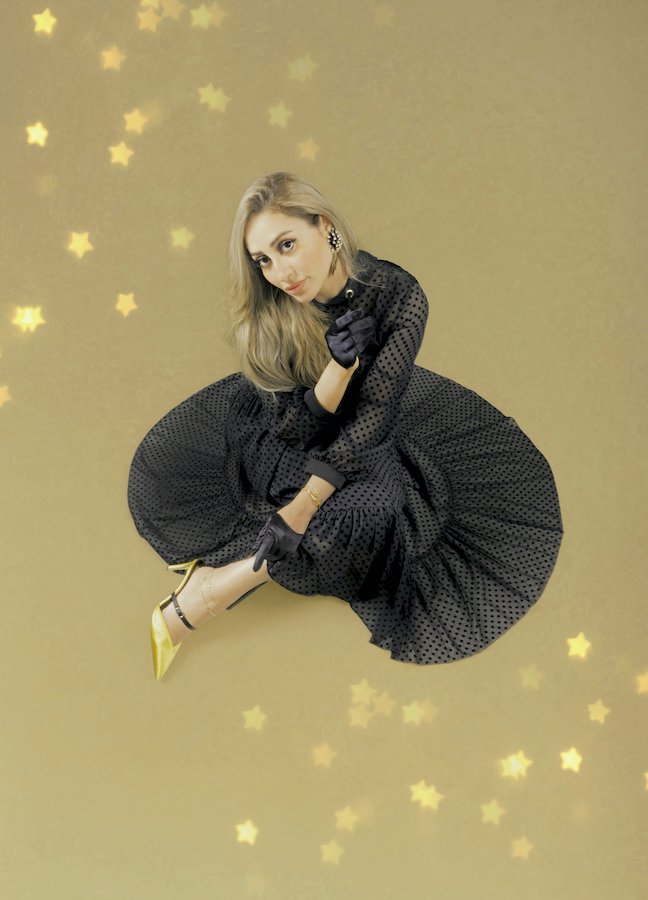Postcards
The Lebanese dream-pop trio released a new track “Home is so Sad,” from their upcoming album “After The Fire, Before The End,” due out later this year. The song is apparently inspired by the eponymous Philip Larkin song. It’s a typically atmospheric track — Julia Sabra’s melancholy lyrics floating over a distorted guitar line built over a pounding drum beat. As Sabra sings of “Blood from your nostrils/Blood from your ears” and “There’s a hole where you knee should be/But I am not afraid” it’s not hard to imagine where the Beirut-based band found the inspiration for this song. The accompanying video, by Nadim Tabet, is the first of a series to go with the album, the band explained on social media: “The idea is to have some sort of visual archive of our shared experiences over the last couple of years.”
Lulu Al-Hassan
The Saudi shoe designer has teamed up with regional retailer Shoemart for a limited-edition capsule collection called “Lule Loves Celeste,” which is exclusive to the Middle East. With 28 satin styles — including peep-toe mules, stilettos, slingbacks and platform heels — in a color palette ranging from classic blacks to bright yellows and reds, the collection will be released just ahead of Eid. “Your shoes are your statement, and this collection will translate that into confidence,” Al-Hassan said in a press release.
OVIID
This exciting Lebanese trio are currently in the process of recording their first EP, and gave us a taste of what to expect recently with a live performance of their song “Statues” for Light FM’s online concert series “Videos in our Studios.” The band describe their sound as “rhythmic prose infused with electronic influences rebirthing heritage, folklore and nostalgia” and “inspired by Kraut, Oriental and Electronica.” “Statues” has something of an Eighties’ vibe, with bassist and vocalist Antonio Hajj’s baritone delivery over layers of looped guitar lines, delivered with subtle skill by guitarist Tony Dauo. Hajj told Arab News, “The track, like the EP, is made up of many rooms; each one is a feeling or a state of mind. It has tension — the ride and the feeling of being suspended in mid-air.” That feeling is mirrored lyrically, he explained: “We talk about how we are taught to internalize and keep to ourselves. The setting we’re in doesn’t help and suffers from an identity crisis itself, so the only way is to keep your ‘light’ and keep going forward.”
Thaier Helal
The UAE-based Syrian artist’s latest solo show, “Abyss,” runs at Dubai’s Ayyam Gallery until May 10. A statement from the gallery says that while the artist’s new work “differs in texture, stepping away from his structural and sculptural approach,” Helal “continues to pose radical questions, (addressing) many subjects concerning our existence, meaning, and current state of bitterness that drains the mind and soul.” His artwork, one example of which — “Behind The Line” — is seen here, falls somewhere between figurative and abstract. “The artist’s technique plays with composition and vantage point,” the gallery continues. “The aim is for each viewer to see something personal that references past experiences, to take the viewer to extremes of imagination.”
Akram Abdulfattah
The Palestinian violinist, composer and producer recently released his second album, “Monologue.” The blend of traditional Arabic music with pop, jazz, and Indian sounds reflects Abdulfattah’s multi-cultural background: He moved to the US from Palestine aged seven. The album is intended to reflect his life’s journey, as well as the politics of Palestinian life. “The album’s sense of collaboration could be seen as a metaphor for long-standing peace in the region,” according to a press release. According to Abdulfattah, the album “can be imagined as a dialogue with the inner self. It’s about finding unity in the self and discovering similarities in the richness of different music languages and culture.”
Allexa Bash
Bash, a Dubai-based Ukranian singer-songwriter, released a new single, “Heartbeat,” in late April. It’s a pop track with downbeat, piano-led verses leading to big choruses dominated by dubstep-style synths. Bash is a former contestant on the Ukrainian version of “The Voice” and her vocals are certainly powerful. Lyrically, according to a press release, the song is about “being real, about showing yourself, about listening to thoughts and embracing them. And, finally, letting your heartbeat act as a lighthouse, leading you in the dark, showing you the way.”

